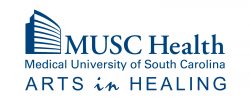
MUSC Arts in Healing was founded in 2018 with the goal to provide access to the inherent healing powers of the arts to improve the health and well-being of the community. From mindful art installations to evidence-based therapy interventions, Arts in Healing’s diverse programming is focused on both clinical and non-clinical needs within healthcare and the community at large. The clinical arm of the department is led by a team of credentialed art and music therapists that provide comprehensive creative arts therapy services to patients and families receiving care in the hospital and to clients served by partnering community organizations, such as students. Arts in Healing is also focused on training and supporting future creative arts therapists, educating people about the impact of creative arts therapy, and policy-making.
MUSC Arts in Healing
There is a mental health crisis facing our children and youth in the United States that has reached a tipping point. In the fall of 2021, experts in pediatric medicine and psychiatry declared a national emergency in children’s mental health, urging organizations to put in place community-based systems of care, connecting families to school-based mental health care that can address inequitable need and access to care. The US Surgeon General issued a similar statement in December 2021 and gave action points on how corporations, healthcare organizations, and the community can support the school as a critical hub for mental health resiliency through promotion of prevention and treatment interventions.Following COVID-19 and the mental health crisis, 70% of public schools experienced an increase in the percentage of students accessing mental health support, requiring educators and mental health leaders to implement innovative and unique approaches to deliver mental health care.
With the national and local trends showing a lack of viable coverage for therapy, it was and is imperative that innovative treatments, such as art therapy, are more widely adopted and accessible within our system. Typical therapies include everyday forms of communication and a certain level of comfort, specifically the patient’s ability to identity and express issues. Young people often experience challenges differently than adults and benefit from unique and creative ways to identify and express their feelings. When words are hard to find, art therapy has a special position in the treatment of our most vulnerable populations because it’s easily accessible and non-threatening.
By expanding services to include the evidenced-based field of art therapy as an option of care specifically within our schools and community organizations serving our children, we can address the increased challenges for young people in our state. With a focus on the future, this collaboration will also create opportunities for policy changes. The growth, research, and impact data disseminated via a partnership between two well-respected organizations (The South Carolina Arts Commission and MUSC Health) can lead to avenues for art therapy licensure and billing options. This will create opportunities to grow our community of art therapists and more importantly, grow options of care for children and adolescents in South Carolina.
Clinical Art Therapy Initiative
Arts in Healing: Epworth Children’s Home
Growth and Policy Changes